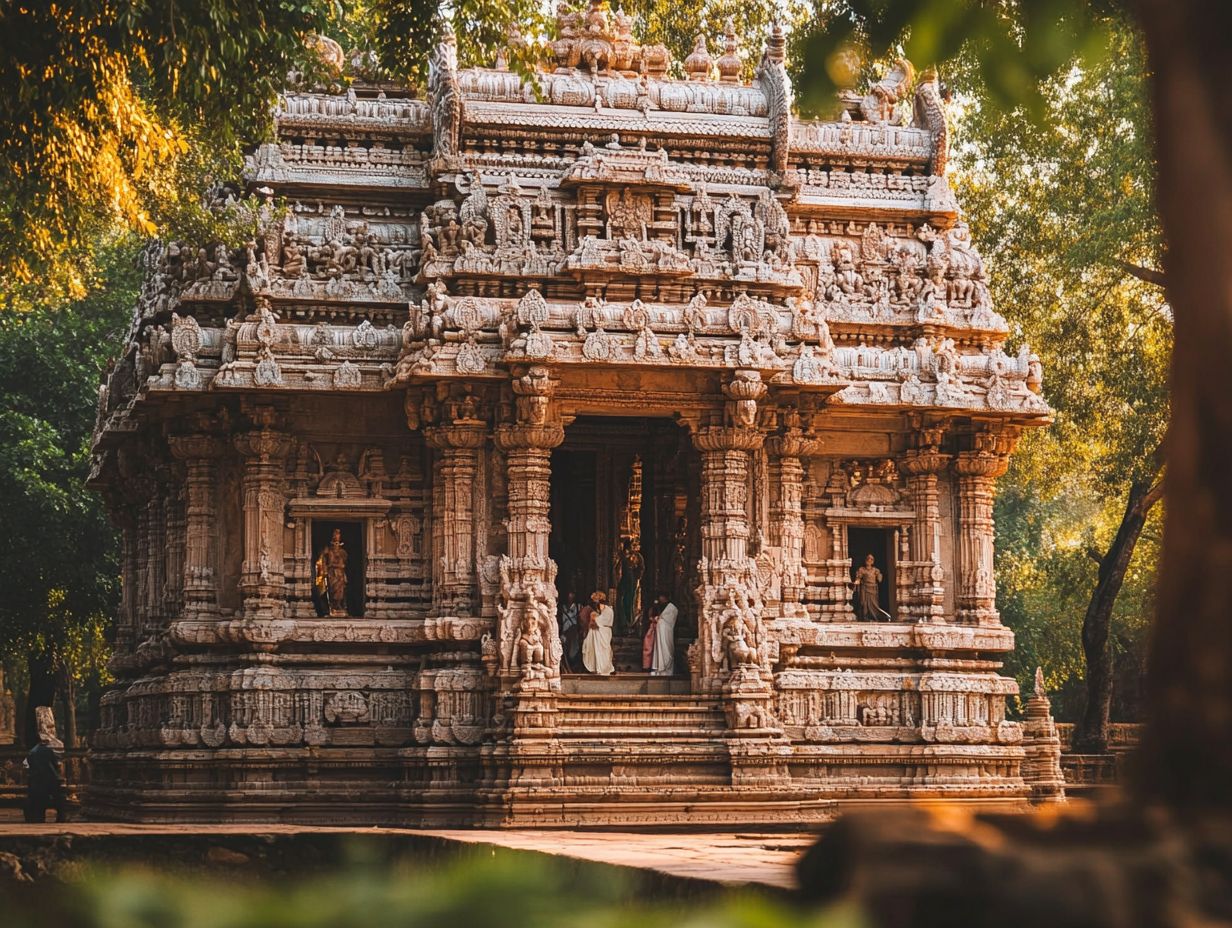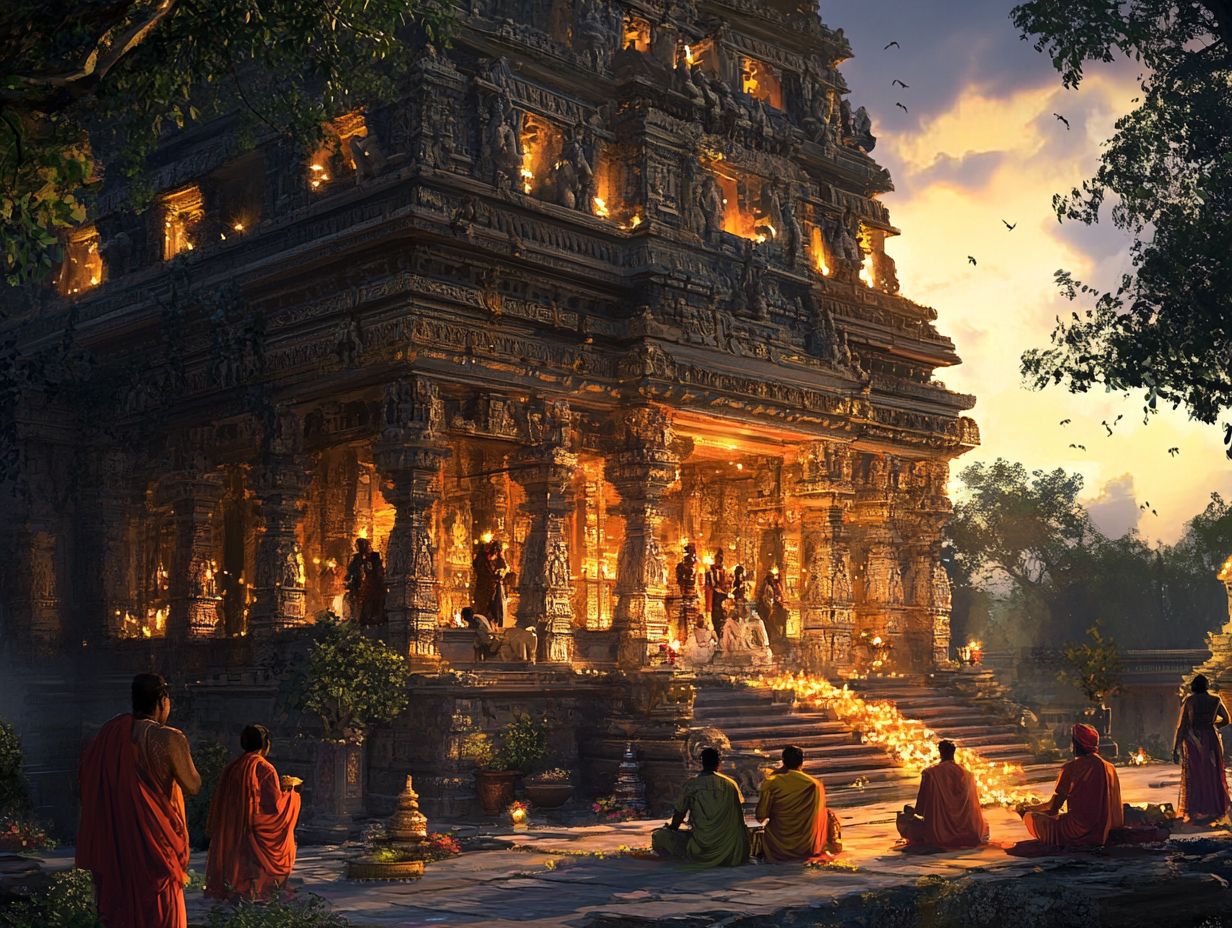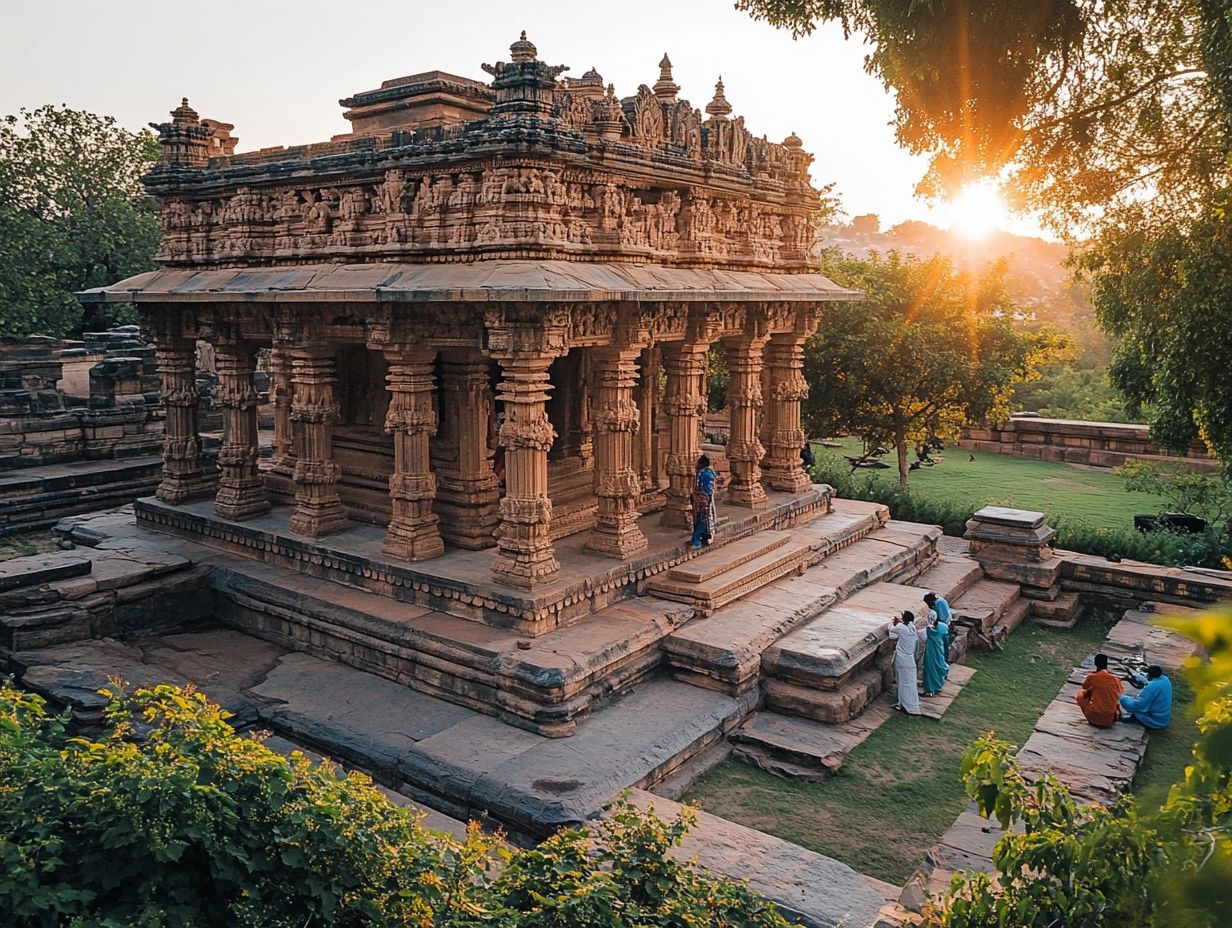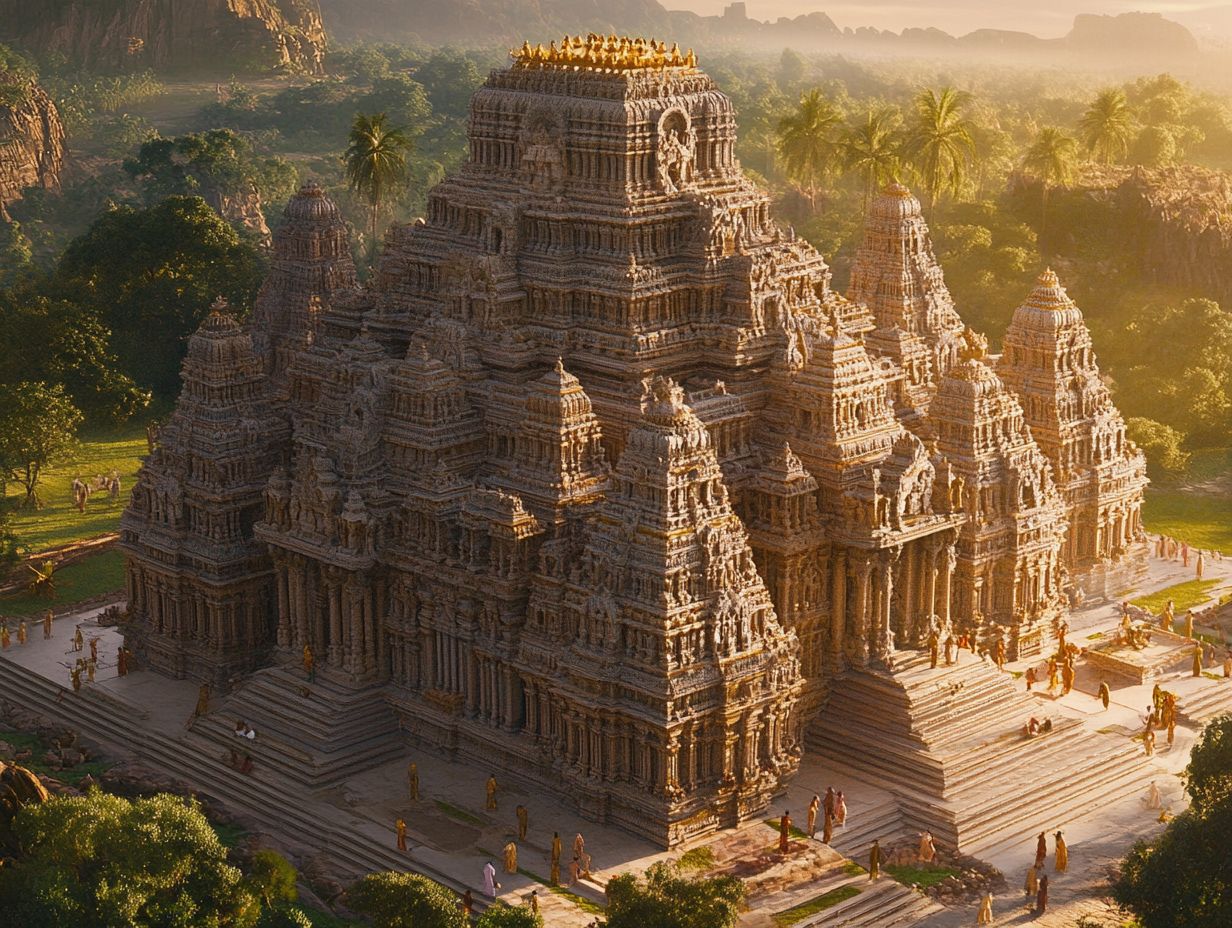Is Vedic Religion Hinduism?
The Vedic religion, often regarded as the foundation of modern Hinduism, occupies a significant position within the spiritual and cultural heritage of ancient India.
This exploration delves into the fundamental tenets of Vedic religion, its core beliefs, and its pantheon of deities, while also examining the intricate relationship between Vedic traditions and contemporary Hindu practices, including festivals like Diwali and Navaratri.
It serves to clarify common misconceptions, highlight historical distinctions, and investigate how elements of Vedic religion persist in shaping Hinduism today, particularly through its rituals and spiritual practices.
This journey invites readers to uncover the rich tapestry of beliefs and rituals that intricately weaves together these ancient and modern spiritual paths.
What Is Vedic Religion and Its Sacred Texts?

The Vedic religion, often seen as the foundation of modern Hinduism, is intricately woven into the spiritual and cultural fabric of India, known as Sanatana Dharma. This ancient belief system arose from the sacred texts called the Vedas namely the Rigveda, Samaveda, Yajurveda, and Atharvaveda which articulate fundamental philosophies concerning Brahman, the ultimate reality, and Atman, the individual soul.
Central to the Vedic framework are concepts such as Dharma, Karma, and Moksha, which guide adherents in leading a righteous life and striving for spiritual liberation. The teachings found in the Upanishads and other Hindu texts further elaborate on these profound themes, forming the bedrock of what is recognized today as Hindu philosophy.
It is essential to investigate how these timeless scriptures and beliefs, including the Puranas and Mahabharata, continue to shape contemporary practices and ideologies.
Is Vedic Religion the Same as Hinduism?
Though Vedic religion and Hinduism share common historical roots, they are distinct in their interpretations and practices. Vedic religion primarily pertains to the ancient rituals and teachings encapsulated within the Vedas, while Hinduism encompasses a broader spectrum of beliefs, traditions, and philosophies that have evolved over centuries.
The transition from Vedic practices to the diverse manifestations of Hinduism illustrates a rich tapestry of spiritual evolution, wherein concepts such as Dharma and Karma have been further developed into comprehensive systems of thought and practice.
An examination of the historical context reveals that, although both traditions emphasize the importance of rituals and the authority of sacred texts, Vedic religion is heavily ritualistic, focusing significantly on yajnas sacrificial rituals aimed at appeasing deities. In contrast, Hinduism introduces a more philosophical approach, integrating ideas from various texts such as the Upanishads and the Bhagavad Gita. This encourages introspection and the pursuit of Moksha, or liberation.
While both traditions venerate deities like Brahma and Vishnu, Hinduism has expanded to include a diverse pantheon, adeptly adapting to regional beliefs and practices. This evolution not only highlights the differences between the two traditions but also underscores an ongoing dialogue within the spiritual landscape, continuously shaping the identities of practitioners today.
What Are the Beliefs of Vedic Religion?
The Vedic religion is marked by a rich tapestry of beliefs centered on the concepts of Brahman, the ultimate reality, and Atman, the individual soul.
At the heart of these beliefs lie the principles of Dharma, which embodies moral order; Karma, the law of cause and effect; and Moksha, the ultimate liberation from the cycle of rebirth.
Additionally, the Vedic religion embraces polytheism, celebrating a multitude of deities and engaging in elaborate rituals, including Vedic chants, sacrifices, and rites of passage.
These foundational beliefs not only shape the spiritual practices within the Vedic tradition but also form the ethical and philosophical frameworks that have profoundly influenced Hinduism.
What Is the Role of Gods and Goddesses in Vedic Religion and Hinduism?
In Vedic religion, gods and goddesses hold a central position as embodiments of various natural forces and principles, influencing the lives of devotees through their divine representations. Primary deities such as Agni, the god of fire; Vishnu, the preserver; Shiva, the destroyer; and Shakti, the embodiment of divine feminine power, are venerated in rituals and practices, including elaborate pujas and yajnas, designed to promote harmony both in the cosmos and within personal lives.
These Hindu deities are essential to the spiritual landscape of Vedic religion, acting as mediators between humanity and the transcendent realm, while guiding followers through their moral and ethical challenges.
The diverse attributes and roles of these deities enrich the devotional experience, as each deity symbolizes profound aspects of existence from creation and sustenance to destruction and renewal. Engaging with these divine figures often entails elaborate rituals, including fire sacrifices (yajnas) directed toward Agni, as well as the chanting of mantras and hymns that celebrate their qualities and narratives.
Devotees actively seek blessings through prayer, offerings, and vibrant festivals such as Diwali and Dussehra, which cultivate a sense of community and connection.
This deep-rooted relationship with the deities not only mirrors individual aspirations but also resonates with the broader Vedic principles of dharma and Karma, ultimately shaping a holistic approach to life that echoes through the generations.
What Is the Concept of Karma and Samsara in Vedic Religion?
Karma, a fundamental principle in Vedic religion and Hinduism, embodies the law of cause and effect, where every action carries consequences that significantly influence future rebirths within the cyclical journey of Samsara. This concept is intricately linked to Dharma, as it asserts that one’s moral and ethical choices shape their spiritual path, ultimately steering them towards Moksha, or liberation from the eternal cycle of life and death.
A profound understanding of Karma inspires individuals to pursue righteous actions and spiritual practices that foster a harmonious existence within the cosmos, aligning with the divine order.
As one delves into the complexities of Karma, a realization dawns that their choices extend beyond the personal realm; they are intricately interwoven into the universal fabric of ethics and cosmic order. Consider the deliberate act of choosing to assist others rather than succumbing to selfish impulses; such altruistic decisions generate positive karmic feedback, paving the way for favorable outcomes in future incarnations.
In acknowledging the importance of Dharma, individuals come to recognize that embracing their responsibilities be it as a parent, educator, or community participant enhances their spiritual advancement. This interconnectedness reveals that by adhering to ethical principles and engaging in selfless service, individuals not only sculpt their own destinies but also contribute to a larger cosmic balance, thus aligning with the divine order and illuminating their journey towards Moksha.
What Are the Sacred Texts and Philosophical Systems of Vedic Religion?

The Vedic religion is deeply rooted in a rich literary tradition, prominently showcased in its sacred texts, which encompass the Vedas, Upanishads, Brahmanas, Aranyakas, and various Sutras. These texts are classified under Shruti (heard) and Smriti (remembered). The Vedas, composed in ancient Sanskrit, stand as the oldest scriptures, serving as foundational texts that outline rituals, hymns, and spiritual knowledge.
In contrast, the Upanishads engage in philosophical discourse, probing profound concepts such as Brahman and Atman, while the Brahmanas and Aranyakas emphasize the rituals and meditative practices integral to Vedic worship and spiritual practices like meditation and yoga.
Each of these categories plays a pivotal role in shaping the spiritual landscape of Vedic religion, providing insights into the beliefs, values, and practices of ancient Indian society. The Vedas offer a systematic approach to rituals and ceremonies, enabling practitioners to connect with the divine through elaborate sacrifices and mantras. The Brahmanas expand upon the rituals delineated in the Vedas, offering detailed guidance on their execution.
Meanwhile, the Upanishads beckon seekers to engage in deeper philosophical inquiries, exploring the nature of reality and the ultimate purpose of life. Additionally, texts like the Yoga Sutras and Vedanta philosophical systems provide further insights into spiritual practices. Collectively, these texts not only illuminate the spiritual wisdom of the era but also exert a lasting influence on contemporary practices and understandings of the Vedic tradition.
What Are the Differences Between Vedic Religion and Hinduism?
Vedic religion and Hinduism, despite their shared lineage, exhibit significant differences in their historical origins, practices, beliefs, and the evolution of their scriptures.
Vedic religion is deeply rooted in the ancient texts of the Vedas, characterized by specific rituals and a primary focus on Brahman. In contrast, Hinduism encompasses a broader spectrum of beliefs, integrating diverse philosophies, deities, and cultural practices that have developed over centuries.
This distinction highlights the dynamic nature of Indian spirituality, illuminating how ancient practices have adapted and transformed into the multifaceted religion recognized today.
1. Historical Origins and Cultural Interconnections
The historical origins of Vedic religion trace back to the arrival of the Aryans in the Indian subcontinent, who introduced the sacred texts known as the Vedas. These texts would eventually lay the foundation for what would develop into Hinduism. This migration coincided with the decline of the Indus Valley Civilization, creating a synthesis of culturally significant practices that significantly shaped early religious beliefs and rituals, leading to cultural diffusion and rich interconnections.
As these new cultural influences began to intertwine with the remnants of local traditions, the early Vedic period emerged, spanning approximately from 1500 BCE to 500 BCE. During this time, the composition of the four Vedas Rigveda, Samaveda, Yajurveda, and Atharvaveda provided a structured framework for rituals and hymns, which honored deities and sought their favor.
Over the centuries, this initial foundation blossomed into complex philosophies and an intricate pantheon of gods, ultimately influencing societal structures and norms. The evolution from the Vedic texts to later philosophical commentaries and practices initiated a gradual yet profound transformation, leading to what is recognized today as Hinduism through a rich tapestry of cultural, theological, and historical developments.
2. Worship Practices
Worship practices within the Vedic religion primarily revolve around elaborate rituals and sacrifices intended to appease deities. In contrast, Hinduism has evolved to encompass a multitude of worship forms, including meditation, prayer, and individual devotion. Vedic rituals typically focus on communal ceremonies and offerings to gods such as Agni, while modern Hinduism embraces a broader spectrum of personal and community-oriented practices, demonstrating its dynamic nature.
This evolution reflects a significant transition from the structured, communal appeasement of celestial forces to a more individualized approach, where practitioners engage in self-reflection and spiritual connection. Whereas ancient rituals were meticulously codified and executed by priests to harness cosmic energies, contemporary worship often embodies a meditative quality, inviting seekers to delve into their inner spirituality.
The emergence of bhakti or devotional movements has infused a profound emotional dimension into the practice, enabling followers to express love and devotion toward their chosen deities in ways that transcend mere obligation. This transition underscores the remarkable adaptability and richness of Hindu spiritual practices, revealing a tapestry of beliefs that continues to inspire and evolve.
3. Beliefs and Philosophies
The beliefs and philosophies of the Vedic religion center around cosmic order, ritual purity, and the quest for spiritual knowledge. In contrast, Hinduism encompasses a broader array of ethical teachings and diverse philosophical schools, including Vedanta and Bhakti. This evolution illustrates the integration of various cultural influences and the inherent flexibility of belief systems that define contemporary Hinduism.
As Hinduism developed, it assimilated concepts from local traditions and other spiritual practices, resulting in a more inclusive perspective on divinity, morality, and the afterlife. This synthesis permitted the flourishing of numerous sects, each offering unique insights into the fundamental questions of existence and the nature of the universe.
The Vedic texts established a foundation for later Hindu thought; however, shifting interpretations and practices have emerged over the centuries, accommodating both the devotional and philosophical inquiries of its adherents. Such dynamic adaptations underscore the ongoing dialogue within the spiritual landscape of Hinduism.
Is Vedic Religion Still Practiced Today?

Though frequently eclipsed by the vast expanse of Hinduism, aspects of the Vedic religion persist in contemporary practice, particularly within rituals, festivals, and spiritual disciplines such as yoga and meditation.
Many modern Hindus weave elements of Vedic rituals into their worship, thereby preserving ancient traditions while accommodating the evolving demands of contemporary spirituality. This enduring legacy serves as a testament to the profound and foundational impact of Vedic practices on the spiritual landscape of India.
What Are the Modern Forms of Vedic Religion?
Modern manifestations of Vedic religion can be observed through a noteworthy resurgence of interest in traditional practices. This includes asceticism, meditation, and the study of ancient scriptures, all of which are often woven into the fabric of contemporary Hinduism.
Practices such as Vedic chanting, yoga, and rituals grounded in the Vedic texts have gained considerable popularity, as individuals seek to reconnect with their spiritual heritage while grappling with the complexities of modern existence.
This revival transcends mere nostalgia; it represents a dynamic adaptation of Vedic principles tailored to address contemporary existential challenges. Movements like the International Society for Krishna Consciousness (ISKCON) serve as prime examples, promoting Vedic teachings through community-driven activities and global outreach.
The contemporary fascination with health and wellness, particularly through Ayurveda, underscores the value placed on holistic living today, deeply rooted in Vedic scripture. Workshops and online courses centered around Vedic philosophy continue to attract a diverse audience, illustrating the timeless appeal of these teachings.
Furthermore, the modern emphasis on mindfulness and self-awareness in therapeutic practices reflects Vedic concepts, demonstrating a seamless integration of ancient wisdom into the complexities of contemporary life.
How Has Vedic Religion Influenced Hinduism?
The influence of Vedic religion on Hinduism is both profound and far-reaching, as numerous core beliefs, rituals, and scriptures from the Vedic tradition have been seamlessly woven into the broader framework of Hindu thought. Key concepts such as Dharma, Karma, and the worship of various deities can be traced back to Vedic teachings, underscoring their pivotal role in shaping the philosophical and spiritual landscape of Hinduism throughout the ages.
For instance, the concept of Dharma, which emphasizes moral duty and righteousness, plays a crucial role in guiding adherents toward ethical living. Rituals such as Yajnas sacrificial ceremonies originated in the Vedic texts and highlight the significance of communal worship and offerings to deities, thus fostering a profound sense of community among practitioners.
The Rigveda, one of the oldest sacred texts, serves not only as a primary source of hymns utilized in these rituals but also lays the groundwork for subsequent scriptures, including the Upanishads and the Bhagavad Gita, which elaborate further on these enduring themes. Through these practices and texts, the essence of Vedic religion continues to resonate within the rich and diverse tapestry of Hindu beliefs today.
What Is the Relationship Between Vedic Religion and Hinduism?
The relationship between Vedic religion and Hinduism exemplifies a dynamic interplay of continuity and evolution. Foundational beliefs and practices originating from the Vedic tradition have been adeptly adapted and transformed, giving rise to the diverse expressions of Hinduism as recognized in the modern era.
This relationship unfolds within a historical context marked by cultural intermingling and philosophical growth, fostering a rich dialogue between ancient teachings and contemporary spirituality.
Are There Any Similarities Between the Two Religions?
The Vedic religion and Hinduism exhibit a wealth of similarities, particularly in their foundational beliefs, rituals, and spiritual practices, many of which trace their origins to the ancient Vedic texts. Concepts such as Karma and Dharma, along with the veneration of Hindu deities, underscore the enduring continuity of thought and practice between these two traditions, forming a robust basis for ethical living and spiritual exploration.
Beyond these fundamental philosophies, both traditions place significant emphasis on rituals such as yajnas (sacrificial offerings) and pujas (worship ceremonies), which highlight the importance of communal participation and devotion. The interconnectedness of these traditions is further reinforced by shared texts, including the Rigveda, as well as later scriptures like the Upanishads and the Bhagavad Gita.
Both frameworks acknowledge a cosmic order and the cyclical nature of birth, death, and rebirth, revealing a profound philosophical similarity that informs numerous practices and beliefs. This historical and spiritual continuity not only enriches individual understanding but also cultivates a sense of unity among practitioners, enhancing the communal fabric of these ancient traditions.
How Have They Evolved Over Time?

The evolution of Vedic religion into Hinduism exemplifies a dynamic journey, profoundly influenced by historical, cultural, and social factors that have led to the rich tapestry of beliefs and practices defining contemporary Hinduism. Over the centuries, the integration of various philosophical schools, regional customs, and the emergence of new spiritual movements highlight the fluidity of religious expression in response to shifting societal contexts.
As the Vedic tradition advanced, it encountered significant external influences, notably from Buddhism and Jainism, which played crucial roles in shaping its doctrines and ethical frameworks. The synthesis of indigenous tribal beliefs, coupled with the infusion of Islamic culture during the medieval period, contributed to a distinctive amalgamation of practices that characterize the faith today.
The advent of texts such as the Upanishads, which are part of the Shruti literature, ushered in profound philosophical explorations, prompting followers to contemplate the nature of existence, the self (Atman), and the cosmos. This interplay between tradition and innovation established a foundation for a richly diverse faith known as Sanatana Dharma, accommodating a multitude of deities, rituals, and interpretations that resonate within communities throughout India and beyond. The Vedas, including the Rigveda, Samaveda, Yajurveda, and Atharvaveda, play a crucial role in shaping these beliefs.
Frequently Asked Questions
Is Vedic Religion Hinduism?
Yes, Vedic Religion is considered to be one of the oldest forms of Hinduism. It lays the groundwork for later developments in Hindu philosophy, ethics, and cosmology, which are integral to Sanatana Dharma.
What is Vedic Religion?
Vedic Religion is an ancient form of Hinduism that originated in India. It forms a significant part of Hindu philosophy and encompasses a range of spiritual practices, rituals, and sacred texts like the Vedas.
What are the main beliefs of Vedic Religion?
Vedic Religion focuses on the worship of deities such as Indra, Agni, and Surya, and the performance of rituals and sacrifices. It also emphasizes concepts like Dharma, Karma, and Moksha, which are integral to the broader spectrum of Hindu beliefs.
Is Vedic Religion still practiced today?
While the majority of Hindus follow modern Hinduism, there are still some followers of Vedic Religion in India and around the world. These practices are often integrated with other aspects of Hindu traditions and spiritual practices.
How does Vedic Religion differ from modern Hinduism?
Modern Hinduism incorporates many different beliefs and practices from various ancient traditions, including Vedic Religion. It also includes teachings from other Hindu texts like the Puranas, the Ramayana, and the Mahabharata, and practices such as Yoga, meditation, and Puja.
Are there any similarities between Vedic Religion and other religions?
There are some similarities between Vedic Religion and other ancient religions, such as Zoroastrianism and ancient Greek and Roman religions. These often include shared elements in cosmology, mythology, and ritual practices.
